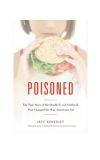
13 Jun 2011 03:46:35
The subject of Jeff Benedict's latest book is as familiar as today's headlines that tell of the hundreds of illnesses, many fatal, caused by a "supertoxic" strain of bacteria in Europe.
We all know now about the bacteria E. coli, strains of which can infect meats and other foods and cause illness or even death when consumed. Part of the value of "Poisoned" is that it returns us to a time when this threat was new, when doctors, public officials and food businesses scrambled to understand it and to save lives.
Benedict, a nonfiction writer who likes to deconstruct complex legal disputes as a way to tell important human stories, focuses on the outbreak of E. coli contamination of beef that sickened hundreds of customers of the Jack in the Box fast-food chain in late 1992 and early 1993. Many of the victims were children, and four of them died, ravaged by the virulent microbe.
One child's case in particular becomes the driving force of the book, as Benedict takes us, in agonizing detail, first through doctors' efforts to save Brianne Kiner, who simply ate an insufficiently cooked, contaminated fast-food hamburger. As we read of the removal of her colon and other surgery, the stopping of her breathing and her long coma as her mother decides whether to disconnect life support machines, we wonder how this child, just 9 when stricken, can possibly survive — and, if so, with what quality of life.
Besides her courageous mother, she has another advocate — a young lawyer named Bill Marler, whose involvement in Brianne's care and her family's quest for compensation forms the heart of the narrative.
Benedict, who has a law degree, is adept at bringing legal proceedings and machinations to life. (He did so previously in his book "Little Pink House," the story of an outrageous eminent domain case that ruined a neighborhood.) As presented by the author, Marler's eviscerating deposition of the Jack in the Box CEO, for example, reads like a gripping courtroom scene in a movie.
Benedict argues that the Jack in the Box case brought a sea change in how food is handled and prepared by the industry, in regulators' oversight and in public awareness of potential dangers.
Although "Poisoned" puts the reader inside the worlds of both a major fast-food company and the government regulatory apparatus as they separately address a preventable bacterial outbreak, the characters here — including a food scientist hired by Jack in the Box with a goal of changing the whole industry — are not drawn as vividly as are the victims' families and the opposing lawyers.
Some peculiarities of the writing, especially in the first half of the book, lessen its impact: In a few cases, Benedict's descriptions of crisis moments create a sense of forced drama. And the author decided to refer to Marler as simply Bill, even when others are called by their surnames; this may have been meant to humanize him or to signal from the start that he'd be the central character, but it became a distraction, especially in the early chapters.
Once the legal story gets rolling, however, "Poisoned" becomes a fast-paced narrative and a cautionary tale about how public health policy, corporate practices and public relations, and lawyers' chutzpah and frenzy for fees can converge in a place we all know well: the neighborhood hamburger joint.
"The Jack in the Box outbreak is considered the meat industry's 9/11," Benedict writes in an author's note. His close examination of our dawning awareness of food-borne illness and the early steps to fight it may help us better cope as outbreaks persist.

